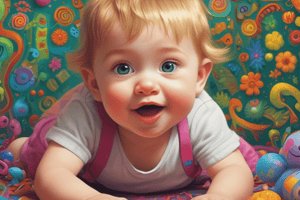Podcast
Questions and Answers
What is the duration of the infancy period?
What is the duration of the infancy period?
Approximately two weeks
Which of the following describes the period of the Partunate?
Which of the following describes the period of the Partunate?
Infancy is a time of radical adjustments; when does this period begin?
Infancy is a time of radical adjustments; when does this period begin?
Infancy is characterized by rapid growth and development following birth.
Infancy is characterized by rapid growth and development following birth.
Signup and view all the answers
Infancy is considered hazardous for what reasons?
Infancy is considered hazardous for what reasons?
Signup and view all the answers
Infants must make adjustments for ___ before they can resume development.
Infants must make adjustments for ___ before they can resume development.
Signup and view all the answers
Name one major adjustment infants must make at birth.
Name one major adjustment infants must make at birth.
Signup and view all the answers
Match the following infant adjustments to their descriptions:
Match the following infant adjustments to their descriptions:
Signup and view all the answers
Prenatal environments do not influence postnatal adjustments.
Prenatal environments do not influence postnatal adjustments.
Signup and view all the answers
Study Notes
Infancy: The Shortest Developmental Period
- The shortest period of development, lasting approximately two weeks. It marks a transition from uterine life to the external environment.
- It is divided into two stages:
- Partunate period: From birth to 15-30 minutes after birth, when the umbilical cord is cut, and the infant is still dependent.
- Neonate period: After the umbilical cord cutting, the infant is independent and needs to adjust to the external environment.
Infancy's Radical Adjustments
- Infancy is a significant transition, moving from an internal to an external environment. This requires adaptation, which might be challenging for some infants.
A Developmental Plateau
- The rapid development during the prenatal period slows down or even regresses slightly during infancy. This is normal and usually lasts for a few days or a week.
- Infants typically return to their birth developmental level by the end of this period.
A Preview of Later Development
- While predicting future development from birth is difficult, newborn development provides clues about what to expect later on.
Hazards of Infancy
- Infancy is a hazardous period, both physically and psychologically.
- Physically: The need to adapt to a new environment leads to difficulties and a high infant mortality rate.
- Psychologically: This period is critical for forming attitudes toward the infant. Attitudes established before birth can change after birth but are sometimes reinforced.
Adjustments of Infancy
- These adjustments are crucial for survival and resumption of development:
- Temperature Changes: The constant temperature of the uterine sac (100°F) is different from the varying temperatures outside (60-70°F).
- Breathing: Infants must learn to breathe on their own after the umbilical cord is cut.
- Sucking and Swallowing: Nourishment shifts from the umbilical cord to sucking and swallowing, which are underdeveloped at birth. This can lead to weight loss.
- Elimination: Waste elimination through the umbilical cord stops, and infants must learn to use their elimination organs.
Influences on Infancy Adjustment
-
Prenatal Environment:
- A healthy prenatal environment contributes to smooth adjustments to postnatal life.
- Neglect or poverty during pregnancy can create unfavorable conditions in the uterus, negatively affecting postnatal development.
-
Birth Environment:
- The birth environment, including the medical intervention and the support provided, can affect the adjustment process.
-
Postnatal Environment:
- The support system, affection, and care received after birth play a significant role in the infant's development and adjustment.
Studying That Suits You
Use AI to generate personalized quizzes and flashcards to suit your learning preferences.
Related Documents
Description
Explore the critical early stages of infancy, including the transition from uterine life to the external environment. This quiz covers the Partunate and Neonate periods, the challenges of adaptation, and the concept of a developmental plateau. Test your knowledge on these essential developmental milestones.




